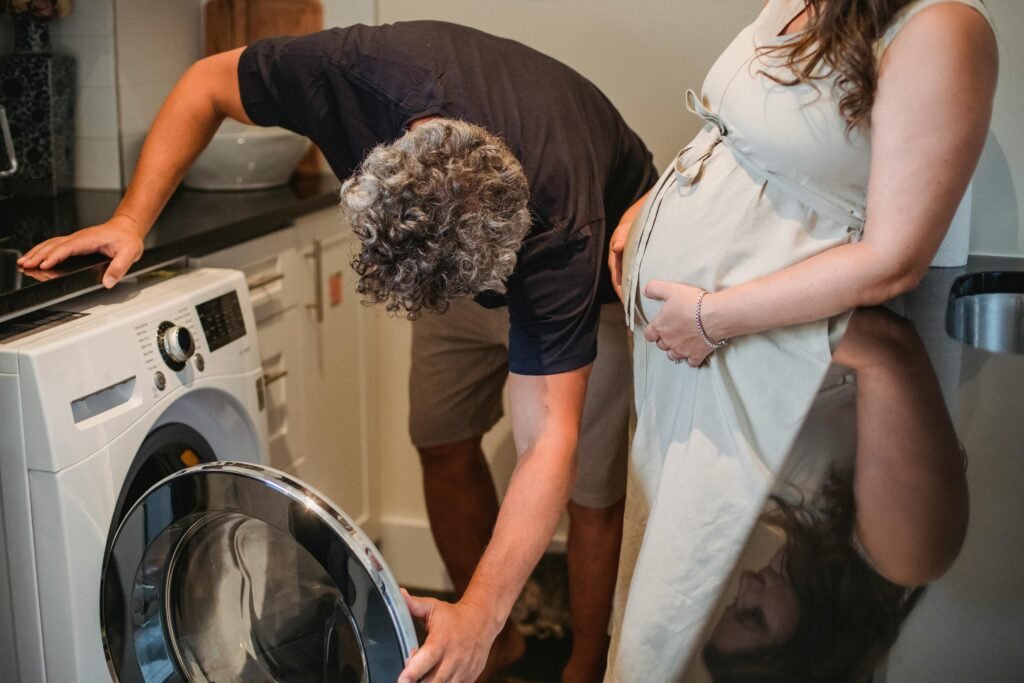The sharing of household tasks among family members determines the level of family harmony. When partners equally share domestic and child care tasks during parenthood their emotional connection becomes stronger. Shared household responsibilities reduce mothers’ traditional workloads which enhances their partnership strength. A teamwork foundation that proves essential in handling family life complexities emerges when partners share family responsibilities together.
Research shows that when fathers participate actively in child-rearing their kids develop enhanced social and emotional abilities. The Journal of Family Psychology research indicates that children benefit from actively participating fathers as they show better academic performance alongside higher self-esteem and improved behavior. Fathers who engage in household tasks help their children build stronger emotional bonds. Family well-being shows meaningful advancement when parents collaborate to uphold consistent parenting standards.
Parents teach children about gender equality and teamwork through their actions as they perform household chores together. When parents distribute household tasks equally it teaches children that motherhood and fatherhood encompass balanced responsibilities. The sharing of household responsibilities among family members leads to a supportive environment that lowers stress levels for all participants.
Parents who divide child care and household tasks equally experience greater satisfaction with their roles. The careful division of duties among family members delivers essential health benefits and practical gains as it strengthens emotional well-being and teamwork resilience.

Communicating Effectively: Expressing Needs Without Nagging
Strong communication abilities form the foundation of successful partnerships in parenting and household management. Open communication between partners about their needs prevents tension from building in their collaboration. Partners should engage in respectful and understanding conversations to prevent resentment from developing through nagging tones.
“I” statements represent the best way to communicate your emotions and needs effectively. I need you to take over the parenting right now because I am having a hard time managing the children and the chores right now. This communication method fosters thoughtful responses through emotional engagement and minimizes defensive reactions. Husbands gain better understanding of support methods when their spouses state their needs clearly.
Actively listening allows partners to hold more efficient conversations together. Mutual understanding through echoing their thoughts and enhanced active listening skills are essential components of effective partnership communication. Using “What I hear you saying is…” prevents misunderstandings while enhancing mutual understanding between partners. Through two-way dialogue partners can gain insight into each other’s viewpoints which leads to better teamwork in home and parenting duties. Learning how to communicate and work together well can be tough. It’s not something we have learned in school. The leading expert in the field of marriage and relationships, John Gottman, Ph.D has written many books about how to make marriages work. Learning how to communicate and work together from an expert is a good first step to collaborating together in your marraige.
Partners who hold regular check-ins maintain open and active lines of communication between each other. Through these discussions partners exchange their perspectives on household and parenting tasks which allows them to work together collaboratively instead of feeling obligated to perform duties. When couples practice these techniques their relationship evolves from nagging conversations into a powerful partnership which enhances all areas of family life and increases parenting effectiveness.

Creating a Collaborative Environment: Setting Shared Goals
A cooperative home environment enables both partners to efficiently handle their childcare and household maintenance tasks. When partners share household maintenance and childcare duties they experience less stress while establishing mutual responsibility and accountability. The essential step in this situation involves establishing joint goals that incorporate both partners’ values and priorities. Family members achieve alignment between their goals and commitments to parenting and household duties when partners make choices that reflect shared values.
A cooperative environment requires partners to engage in open discussions that help them understand each other’s expectations and preferences. Individual strengths enable family members to perform their household tasks and parenting roles with optimal efficiency. The partner who demonstrates exceptional proficiency at handling routine tasks stands out due to their ability to organize activities. Couples who delegate household tasks based on innate strengths see better satisfaction and productivity outcomes.
An essential mechanism to enhance family teamwork is represented by a family action plan. When a household plan combines common objectives with strategic methods and precise responsibilities it enables family members to understand their designated tasks. Members monitor their progress through routine family meetings during which they adjust duties as needed and recognize family achievements in parenting and household management. When partners work together as a team their joint dedication strengthens household management and promotes parental harmony.
Couples who work together to define their responsibilities and goals can successfully minimize normal household and parenting tensions. The practice of planning ahead assists partners in developing mutual respect as they face the challenges of motherhood and home life together. Through shared goal setting and joint decision-making about responsibilities couples develop collective empowerment and build a supportive home environment for their family.

Encouraging Engagement: Practical Tips and Activities
Several practical approaches help husbands actively engage in household duties and child care responsibilities. Household responsibilities become clear through visual family chore charts which operate as a successful tool for task distribution among all family members. This system generates detailed task assignments which simultaneously develops a teamwork methodology for managing household tasks. Household responsibilities become shared when both partners manage daily tasks together which helps reduce parenting and home management burdens. Chore charts are great to get the children involved too. They will see the chart as for everyone and create a collaborative approach between all family members.
The practice of fathers setting aside special time for activities with their children generates stronger family bonds. Parents develop stronger father-child relationships by organizing outdoor trips and interactive play sessions together. Parental activities give fathers parental happiness while their participation establishes a balanced responsibility framework that fosters a nurturing environment for children’s growth under both parents.
Family systems depend on husband participation in decision-making to maintain balanced dynamics. Husbands who become involved in family decision-making processes develop ownership and responsibility which then results in greater participation in household duties. Mutual respect is achieved between partners through building a collaborative environment while they work together on financial planning and activity coordination. Husbands develop stronger household duties participation because they receive recognition and appreciation that produces continuous positive reinforcement.
The application of these tips as part of daily routines will bring about total change in how households are managed and parenting responsibilities are handled. A productive partnership emerges when couples turn their household tasks into fun activities while sharing parenting responsibilities to establish a balanced and harmonious family life.
